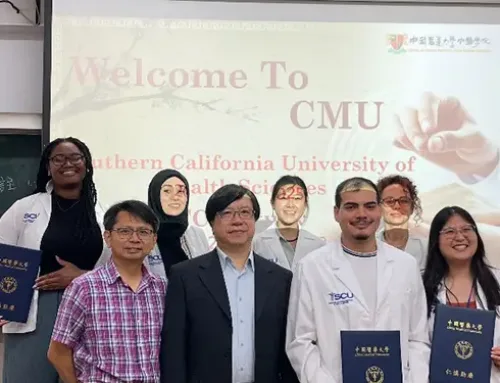Acupuncture Continuing Education: Building Advanced Skills for a Competitive Practice

Acupuncture continuing education (CE) is more than a licensure requirement—it’s a chance to sharpen your clinical edge, expand your scope, and bring even more value to your patients. As the field grows more integrative and competitive, practitioners who stay current with advanced techniques, specialty knowledge, and emerging research stand out in meaningful ways.
Whether you’re aiming to deepen your diagnostic skills, explore new treatment approaches, or build toward a specialization, the right education path can open doors. From flexible online courses to in-person intensives, there are more ways than ever to learn, grow, and evolve your practice.
Why Lifelong Learning Is Part of a Strong Acupuncture Practice
Continuing education plays a central role in both professional development and patient care. Whether you’re working toward license renewal or building a stronger foundation in a new clinical area, the CE path helps keep your skills sharp and your practice current. Many states and national organizations—like the California Acupuncture Board and NCCAOM—require a set number of CE hours every renewal period. These often include updates on safety, ethics, laws, and evolving standards of care.
Meeting Licensing and Certification Requirements
Continuing education keeps your credentials active and your practice aligned with the latest industry guidelines.
Core areas often required:
- State-specific acupuncture laws and practice regulations
- Clean needle technique and safety protocols
- Clinical ethics and professional boundaries
- Core competencies for national certification
Keeping Pace with Advancements in Medicine
New studies continue to highlight acupuncture’s role in pain management, women’s health, and integrative care. Many CE programs now include research-based modules on treatment outcomes, advanced diagnostic skills, and collaborative care strategies. This helps practitioners refine their approach while staying aligned with the latest clinical findings.
Acupuncturists who keep learning often discover new interest areas—from functional medicine to electroacupuncture to adjunctive therapies that support complex patient needs.
Patient Trust and Practice Growth
Patients today often do their research. They look for acupuncturists who stay active in their field and bring updated knowledge into the treatment room. Ongoing education signals professionalism, curiosity, and care—and it opens the door to new services your patients may be asking about.
Training in specialized areas like cosmetic acupuncture, sports medicine, or fertility support can help expand your practice, reach new populations, and keep your day-to-day work both dynamic and rewarding.
Specialties, Skills, and Strategies for Growing Practitioners
As your practice evolves, so should your skill set. Whether you’re adding new treatment options or building deeper expertise in diagnosis and case management, there are plenty of ways to grow—and each one can help you deliver more focused, effective care.
Specialized Techniques
Advanced CE courses often dive into technique-specific training that requires hands-on refinement and clinical feedback.
Popular topics include:
-
- Electroacupuncture for pain and neuromuscular conditions
- Scalp and auricular acupuncture for neurological support
- Pediatric and geriatric treatment modifications
These areas allow you to offer more tailored care for a wider range of patients while continuing to build clinical confidence.
Adjunct Modalities
Complementary therapies like cupping, Tui Na, and advanced herbal medicine integration allow practitioners to support patients through a broader lens. Many CE paths now offer refreshers or deep dives into these modalities, helping you refine application, dosage, and therapeutic planning for real-world cases.
Clinical Case Management & Diagnostics
Effective care depends on how well you understand your patient’s full picture. Continuing education in diagnostic frameworks and case planning can sharpen your ability to assess, synthesize, and design treatments that respond to complex needs. Some programs offer integrated training that bridges Traditional Chinese Medicine with Western diagnostics, giving you a more versatile foundation.
Practice Management and Business Skills
Behind every successful clinic is a solid understanding of how to run one. CE focused on business development covers everything from insurance coding and billing to marketing and patient communication. Courses on ethical growth strategies and retention planning give you the tools to build a sustainable, thriving practice that reflects your vision.
Stay Sharp, Go Further: SCU’s Commitment to Practicing Acupuncturists
At Southern California University of Health Sciences (SCU), we believe that professional growth doesn’t stop at licensure. We’re deeply invested in helping acupuncture professionals expand their scope, sharpen their clinical skills, and grow in leadership through flexible, forward-thinking programs designed with real practitioners in mind.
Hybrid Master’s and Doctorate Programs with Flexible Schedules
Licensed acupuncturists can advance their education with SCU’s Doctor of Acupuncture and Chinese Herbal Medicine (DAcCHM) program. Available in daytime, evening, and blended formats, our program is built to work around your practice—without compromising on clinical depth or academic rigor.
- Learn from expert faculty while maintaining your schedule
- Develop skills in integrative care, clinical leadership, and business strategy
- Step into interdisciplinary environments to expand your career potential
Practice Enhancement Through Specialized Electives
Our advanced programs offer targeted electives designed to keep your practice evolving. From Sports Medicine and Functional Medicine to Advanced Herbal Formulations and Eastern Nutrition, our elective tracks let you focus on what matters most to your patients—and your growth.
Unique Clinical Rotations and Experiences
You’ll gain rare access to rotation sites like Children’s Hospital of Orange County (CHOC), VA hospitals, and other collaborative settings. These ara deep-learning experiences that prepare you to handle complex cases and collaborate effectively across healthcare teams.
We’re also proud to offer cadaver lab training, something few acupuncture programs include. It gives students and practicing professionals a better grasp of human anatomy, improving safety, confidence, and precision in clinical applications.
Investing in Your Growth
We offer a fixed-rate tuition guarantee, so what you see at enrollment is what you’ll pay throughout your program—no surprises. And with scholarships available, you can focus on advancing your career without worrying about mounting costs. At SCU, we support your commitment to care with our own commitment to affordability and access.
Built for the Future of Acupuncture
Acupuncture continuing education plays a crucial role in staying licensed, building specialized skills, and advancing patient care. Whether you’re diving into pediatric acupuncture or refining your herbal expertise, growth is ongoing—and necessary. Our programs are shaped to support licensed acupuncturists who want flexible, rigorous, and career-focused training options.
SCU is here to support that next chapter. With advanced degrees, one-of-a-kind clinical experiences, and a whole-health approach, we help acupuncture professionals keep learning, keep growing, and keep leading. Take a closer look at our admissions process and see how our continuing education opportunities can fit your life and goals. Apply today—we’d love to meet you.
FAQs
How many hours of acupuncture continuing education do I need per renewal cycle?
Requirements vary by state and certification board. For example, NCCAOM requires 60 PDA points every 4 years. Check with your state licensing board for exact details.
Do online courses carry the same credit as in-person ones?
In most cases, yes—if the provider is accredited and approved by your licensing board. It’s important to verify the course format is accepted for your renewal.
How do I know if a course will count toward my NCCAOM renewal?
Look for courses that offer PDA points through NCCAOM-approved providers. Always double-check on the NCCAOM portal or with the course provider.
Does SCU offer financial aid or scholarships for continuing education students?
Yes. SCU offers a fixed tuition guarantee and financial aid options to eligible students. Scholarships are also available based on merit and need.
How do I track my completed CE hours?
Keep certificates for every course and use your board’s tracking system if available. NCCAOM professionals can log in to their portal to manage PDA points.
Related Posts




